Aug 2017
Seal pup humanely euthanized
Aug/21/17 07:38 PM
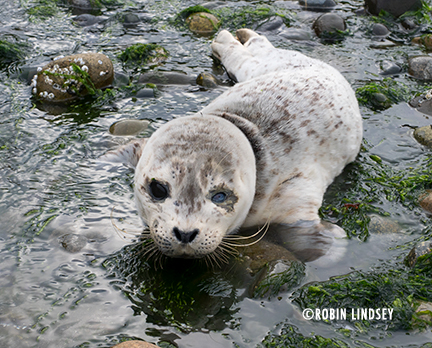
Taping off the entrance to the beach, a call was placed to Volunteer Scheduler Karin and a “seal on the beach now” email was sent out. Karin lined up volunteers Judy, Jimi and Dori (the latter brand new trainees). Responders Lynn, Robin and Dana all dropped by to help.
The pup was tiny and terribly thin - not a good sign - and had some kind of issue with the left eye. Photos of a wide yawn revealed a full set of teeth which would indicate the pup was close to weaning or newly weaned. At 9:40pm Friday night, the pup, nicknamed Randy, was still resting on the beach and the cove remained closed throughout the night.
At 6:30am, Dana checked the beach and Randy was in the same spot. She observed seizures and dialed Robin who drove down to the Park. A call was promptly placed to NOAA since many of the area’s consulting marine mammal vets were dealing with the live stranded juvenile gray whale on Washington’s outer coast. PAWS Wildlife Center was then contacted for possible euthanasia, though rehab was very much a possibility if the pup seemed viable.
Robin and David captured the pup, who was transported to the facility in Lynnwood. Sadly, shortly after intake and exam, he was euthanized for a number of health issues. Measuring only 80cm in length and weighing just 7.405kg (a little over 16lbs), Randy also had a serious eye injury: the cornea had ruptured, causing a nasty infection. It was deemed by PAWS veterinary staff that euthanasia was the most humane option. While a blind seal can survive in the wild since they are able to use their whiskers to locate prey, there were just too many hurdles for this little pup to overcome.
WDFW Marine Mammal Biologist Dyanna Lambourn will perform a necropsy on Randy and we will update with findings here.
Thanks to everyone who kept Randy safe from harm and suffering.
Molting elephant seal makes a surprise appearance
Aug/10/17 08:39 PM
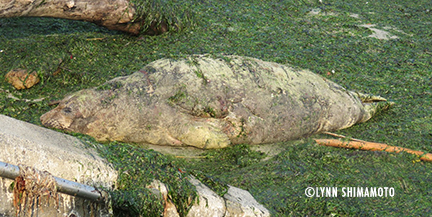
It was easy to see why callers were worried. The animal looked terrible - crusty with seaweed, a rough patchy coat, abrasions and cracked skin. “Ellies” go through an exhausting catastrophic molt each year and it isn’t a pretty sight. Over the course of a number of weeks, they spend many hours onshore as they shed the entire outer layer of skin and fur. They can sometimes develop infections. This large, rotund seal at the base of the steps to the beach was flipping sand over its back and pressing wet, cool sand along its sides with the foreflippers, trying to get some relief.
One of the callers who reported the seal, Judy stuck around til Lynn arrived and pitched in to help set the tape perimeter. SS First Responders David and Eilene arrived lugging high-visibility cones, stakes and signboards. Because the tide was rapidly receding, the tape barrier was constantly extended to create a safey zone. Scheduler Molly arrived and promptly lined up volunteers Jen, Karen, Melinda, Gordon, Aaron and Karin who talked to the hundreds of curious people who came by. Dr. Liz Mansi, who recently participated in NOAA’s consulting veterinarian training, came at Lynn’s request to assess the seal’s condition.
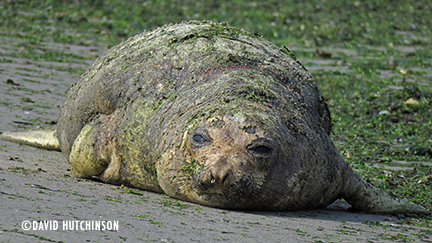
Elephant seals usually keep to the outer coast, but over the past decade, a small colony has established itself at Race Rocks Ecological Reserve in the Strait of Juan de Fuca. The first pup was born there in 2009. There are a few locations where individuals will haul out in the inland waters. According to WDFW Marine Mammal Investigations Unit’s Steve Jeffries, pups have now been born at Protection, Smith and Whidbey islands, Dungeness Spit and Race Rocks - with a total of 10 to 15 pups born annually. Over the years, Seal Sitters has responded to three female elephants seals, all located south of the Fauntleroy ferry terminal, the last one in 2011.
It is estimated that the Alki elephant seal was a subadult, 6ft long and about 600 lbs. Thanks to WDFW’s marine mammal biologist Dyanna Lambourn for reviewing photos.
Around noon, the huge seal made the move to the water’s edge, rolling along with powerful undulations - much like a tank - and slowly swam away. Seal Sitters volunteers and a transfixed public watched Tank slowly drift west and out of sight. Thanks to the many volunteers who help give this seal in need a little peace onshore today.
Rescued abandoned pup a likely victim of harassment
Aug/09/17 09:27 AM
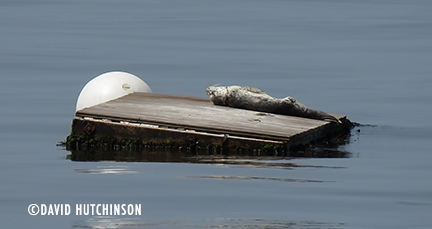
Waterfront homeowners called Seal Sitters’ hotline (206-905-7325) concerned that there was a possible dead seal pup on a raft off private beach property. While a number of seals had used the raft for the past couple of weeks, the pup had been entirely alone for two days. Seal Sitters responders were allowed access to assess the situation. We were informed that kayakers had been regularly coming within 10 or so feet of the raft recently and that a paddle boarder had even sat on the platform with the pup. This is an overt violation of the Marine Mammal Protection Act that protects marine mammals from illegal harassment. Is it any wonder that the pup was abandoned? Always stay back from resting seals.
After observing the horribly skinny pup for some time and seeing no movement, it was determined that the pup had indeed likely died. Responders left and brain-stormed a plan to retrieve the body by kayak. WDFW’s Dyanna Lambourn was called to see if she could necropsy the pup if fresh-dead enough for tissue and blood samples. Just as that option was being put into motion, the homeowner called to say he had seen movement - the pup had lifted a flipper. Our recovery mission had just become a rescue.
Now, we had a new set of challenges. Capture of a live pup via kayak would be unlikely to succeed. A call was put into NOAA’s Kristin Wilkinson to get permission to contact SR3, a new marine mammal-focused non-profit with a Zodiac vessel, to see if they might assist. Only members of the Marine Mammal Stranding Network are allowed to approach and handle marine mammals. Permission was granted. SR3 Director and Veterinarian Lesanna Lahner jumped at the opportunity to help.
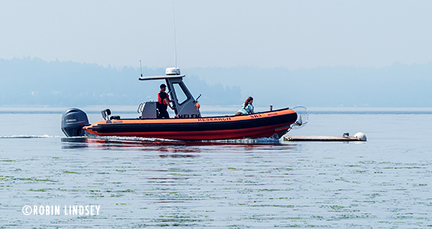
While SR3’s Casey McLean waited with their new ambulance and SS Responders Robin, Lynn, David and Eilene observed from shore, the rescue was attempted. The first effort was unsuccessful as the pup, now nicknamed Gilligan, slipped off his small wooden island into Puget Sound as the boat got close and Lesanna swooped the landing net.
Lesanna and Doug waited patiently nearby for the pup to return. After about half an hour, the pup managed with difficulty to get back up onto the raft and settled in for a snooze. The boat roared into action (photo above) and, miraculously, Lesanna managed to scoop up the surprised animal and transfer him into a kennel.
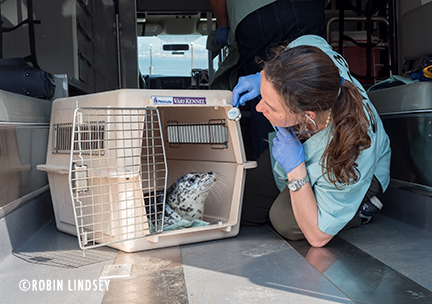
We will post a health update once we hear from PAWS today. Because he is so thin and possibly has some pneumonia, Gilligan faces an uphill battle.
Huge thanks to the homeowners who not only reported this pup in trouble, but graciously allowed us access to assist in Gilligan’s rescue. It was an exhilarating and rewarding effort by all involved!
PUPDATE 8/10/17
PAWS reports that Gilligan is doing okay, seemingly with no significant health issues except being grossly underweight. Further tests may reveal underlying causes.
First seal pup of the season visits Lincoln Park
Aug/09/17 08:26 AM
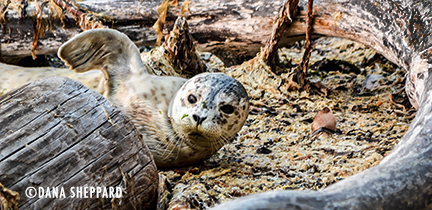
First Responder Dana arrived on scene to find a tiny, velvety pup nestled near the woody debris, high on the beach just feet from the walking path. With the help of a few enthusiastic beach-goers, including the reporting party, she managed to get a quick perimeter in place around the resting pup.
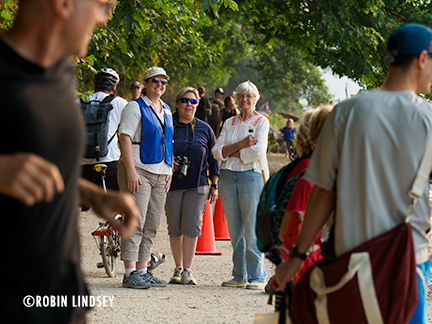
We hoped to get a peek at the belly to see if there was an umbilical cord or stub to help us determine age. Murmuring “Roll over, roll over,” Dana came up with the clever name of Beethoven. Eventually, Beethoven did roll over and we could see no stub. The pup yawned widely and showed numerous teeth that had not quite fully emerged. Assuming Beethoven was not born prematurely, he is probably about 3 weeks old and still nursing age. However, based on body weight and conditon, it was apparent that the mother had not been around, attending her pup. One of the many challenges a newborn pup faces is abandonment due to disturbance from people and dogs.
As darkness fell and Beethoven returned to the Sound, plans were put into place for a vet consultation and health assessment if the pup returned the following day to Lincoln Park or a nearby beach. Lincoln Park shoreline was scoured Monday morning, but Beethoven has not been sighted since.
Harbor seal pupping season well underway in Washington
Aug/06/17 04:36 PM
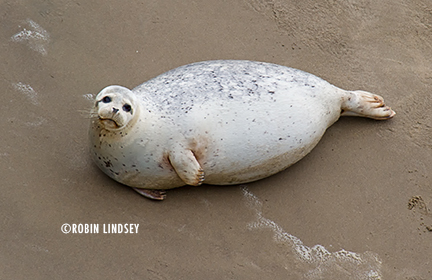
Rotund pregnant females (photo right) can be seen hauled out on sandbars and rocky outcroppings, waiting to give birth. Seal moms with nursing newborns, along with pups that are newly weaned and independent, are resting on shore, log booms, private docks and marinas. For a map showing pupping seasons in the various regions of Washington state, click here.
DO NOT FEED, TOUCH OR MOVE SEAL PUPS - ALWAYS STAY BACK
Please be alert if you are strolling along ocean and Puget Sound beaches. On outer coast beaches that permit driving of motorized vehicles, be extra cautious - a tiny seal pup can look like a piece of bleached driftwood, easily run over and killed. If you come across a pup, please stay back and observe quietly from a distance. Contact the local stranding network.
It is normal for a seal pup to be alone on the beach - always keep dogs leashed and away. Stay back. Occasionally a mother harbor seal will leave her pup resting alone, returning to nurse. Or, if a pup was born on a dock or raft, often the pup cannot get back up onto the structure with mom and will end up on shore nearby. If there are people and dogs too close, she may abandon the pup. Most times, however, the pup will accompany mom to learn how to forage. Once pups are weaned at 4-6 weeks, they will be all on their own, using shoreline daily to rest and warm up before returning to the water. Seals of all ages rest on shore about 50% of their day. Undisturbed, stress-free rest is crucial to their survival.
STAY FAR AWAY FROM SEAL HAUL-OUTS TO PREVENT PUP ABANDONMENT
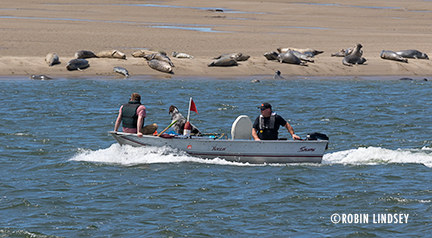
MARINE MAMMALS ARE PROTECTED BY FEDERAL LAW
It is illegal to disturb marine mammals. Harassment can be reported by calling NOAA Office for Law Enforcement’s national hotline at 1-800-853-1964 (information may be left anonymously, but details are critical for enforcement purposes).
In South Puget Sound, seal pupping season usually begins in late-June and extends into the first week of September. As pups are weaned in area rookeries, they venture off to surrounding areas. West Seattle’s busiest months for newly weaned seal pups are September and October, but over the past few years, more lanugo (premature) and newborn pups have been seen here in June. These newborn pups in urban areas, like lanugo pup Luigi, are highly likely to be abandoned because of human activity and off-leash dogs.
If you see a pup alone onshore, stay back and notify your local Marine Mammal Stranding Network. In West Seattle, call the Seal Sitters hotline @ 206-905-SEAL (9325). Click the links for a map of stranding networks in the Pacific Northwest: Washington map | Puget Sound map | Oregon map
Visit Seal Sitters’ website to learn more about harbor seals.
Help protect marine mammals - volunteer!
Aug/06/17 01:30 PM
Join Seal Sitters Marine Mammal Stranding Network! Volunteers are vital for the protection of seal pups and other marine mammals. Now in our 11th year, we also perform a public service by providing education about marine life and our fragile marine ecosystem to local residents and visitors from around the world.
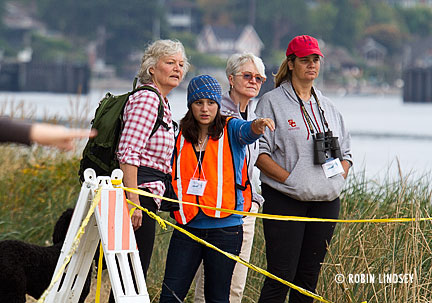 NEW VOLUNTEER TRAINING SPRING SESSION: SATURDAY, AUGUST 12, 2017
NEW VOLUNTEER TRAINING SPRING SESSION: SATURDAY, AUGUST 12, 2017
Seal Sitters MMSN holds several special trainings a year for those wanting to protect marine mammals along the shoreline of West Seattle and the Duwamish River.
We are a very active network and have volunteers who travel from around the area to participate. However, if you live out of the West Seattle area and would like to find a stranding network closer to where you live, click here.
*Please note:
Every stranding network requires their own unique training - attending a Seal Sitters MMSN training does not qualify you to volunteer for networks in a differing location.
Unlike most marine mammal stranding networks, we encourage children to participate in Seal Sitters - supervised at all times, of course, by a parent or guardian. We are so proud of our amazing and dedicated volunteers who are on duty rain or shine - we hope you will join us!
A multi-media presentation will illustrate our educational work in the community and the unique challenges of protecting seals and other marine mammals in an urban environment. Included in the training is an overview of NOAA's West Coast Marine Mammal Stranding Network and biology and behavior of seals and other pinnipeds (due to time frame, supplementary sessions will include more marine mammals of Puget Sound).
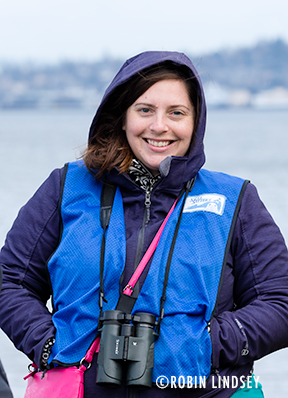 WHEN:
WHEN:
SATURDAY, AUGUST 12, 2017
TIME:
10am-12:30pm (doors open at 9:30am, training starts promptly at 10)
*please arrive early to receive paperwork
WHERE:
ALKI UCC (*there is no church affiliation with Seal Sitters MMSN)
front meeting room
6115 SW Hinds St
West Seattle (map it here)
RSVP required to attend. (*please include full name and name/ages of children)
*PARENTS PLEASE NOTE: all children in attendance must be able to sit quietly through an approximate 2 hour training session with a short break.
For additional questions and info or to be placed on a contact list for future training opportunities, please email us.

Seal Sitters MMSN holds several special trainings a year for those wanting to protect marine mammals along the shoreline of West Seattle and the Duwamish River.
We are a very active network and have volunteers who travel from around the area to participate. However, if you live out of the West Seattle area and would like to find a stranding network closer to where you live, click here.
*Please note:
Every stranding network requires their own unique training - attending a Seal Sitters MMSN training does not qualify you to volunteer for networks in a differing location.
Unlike most marine mammal stranding networks, we encourage children to participate in Seal Sitters - supervised at all times, of course, by a parent or guardian. We are so proud of our amazing and dedicated volunteers who are on duty rain or shine - we hope you will join us!
A multi-media presentation will illustrate our educational work in the community and the unique challenges of protecting seals and other marine mammals in an urban environment. Included in the training is an overview of NOAA's West Coast Marine Mammal Stranding Network and biology and behavior of seals and other pinnipeds (due to time frame, supplementary sessions will include more marine mammals of Puget Sound).

SATURDAY, AUGUST 12, 2017
TIME:
10am-12:30pm (doors open at 9:30am, training starts promptly at 10)
*please arrive early to receive paperwork
WHERE:
ALKI UCC (*there is no church affiliation with Seal Sitters MMSN)
front meeting room
6115 SW Hinds St
West Seattle (map it here)
RSVP required to attend. (*please include full name and name/ages of children)
*PARENTS PLEASE NOTE: all children in attendance must be able to sit quietly through an approximate 2 hour training session with a short break.
For additional questions and info or to be placed on a contact list for future training opportunities, please email us.







